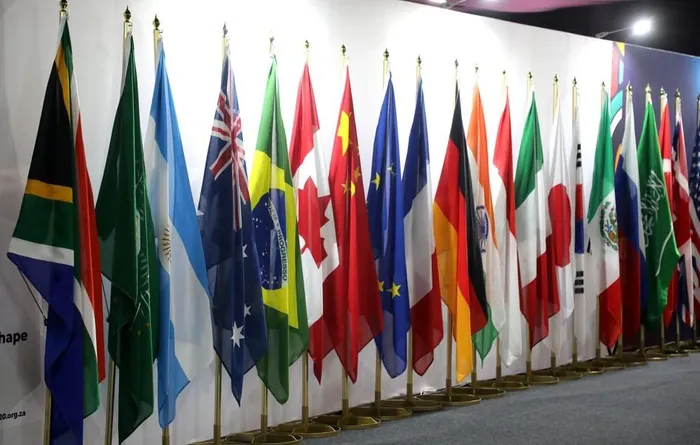Former world leaders urge G20 to create a panel on inequality as Summit opens in Joburg
G20

Former world leaders argue that worsening global inequality is contributing to everything from poverty and climate disruption to stagnant living standards, warning that “rising inequality erodes public life” and threatens “the health of democracy itself.”
Image: Timothy Bernard / Independent Newspapers
More than two dozen former Heads of State and government have called on G20 leaders to establish a global body to “help the world address the inequality emergency”, urging the creation of an International Panel on Inequality ahead of the G20 Leaders' Summit in Johannesburg this weekend.
The proposal – described as an “IPCC for Inequality” – is contained in a new report compiled by the G20 Extraordinary Committee of Independent Experts on Global Inequality, chaired by Nobel Prize–winning economist Joseph Stiglitz.
The report will be presented during the opening session of the Summit on Saturday.
The timing comes as South African President Cyril Ramaphosa, Brazil’s President Luiz Inácio Lula da Silva, and Spanish Prime Minister Pedro Sánchez have all publicly endorsed the establishment of such a panel, signalling rising political momentum.
In an open letter released on Friday, former Colombian president and Nobel Peace Prize laureate Juan Manuel Santos; former Norwegian prime minister Gro Harlem Brundtland; former Swedish prime minister Stefan Löfven; Spain’s former prime minister José Luis Rodríguez Zapatero; former Malawi president Joyce Banda; former New Zealand prime minister Helen Clark; and former Irish Taoiseach Leo Varadkar were among the prominent signatories calling inequality “the crisis that sits at the root of many others.”
They argue that worsening global inequality is contributing to everything from poverty and climate disruption to stagnant living standards, warning that “rising inequality erodes public life” and threatens “the health of democracy itself.”
“Unfortunately, inequality has hit crisis levels across the world. Wealth inequality has increased in most countries in recent decades. Globally, for every $1 of growth since 2000, the richest 1% have captured 41 cents. The bottom half of humanity have had to share the remaining 1 cent. In country after country, inequality undermines economies, drives polarisation, and fractures the bonds that hold us together,” read the letter.
“Yet – as the report shows – we cannot address one of the world’s greatest crises without knowledgethat is dependable, comprehensive, and coordinated. Consider the indispensable work done by theIntergovernmental Panel on Climate Change (IPCC), which has helped the world address the climate emergency. In a similar vein, we now need a body to help the world address the inequality emergency.”
The proposed International Panel on Inequality, they argue, must assess how major global forces — including trade, technology, and artificial intelligence — shape inequality and must “let the facts lead”, highlight inequality trends; and assess impartially the impacts of policies on addressing the divide.
Graça Machel, founder of the Graça Machel Trust and former First Lady of South Africa and Mozambique, also signed the letter, invoking Nelson Mandela’s enduring message: “As long as poverty, injustice and gross inequality persist in our world, none of us can truly rest.”
She joins a broad coalition of global statespeople, including Jan Peter Balkenende (Netherlands), Valdis Birkavs (Latvia), Micheline Calmy-Rey (Switzerland), Kim Campbell (Canada), Laura Chinchilla (Costa Rica), Marie-Louise Coleiro-Preca (Malta), Dalia Grybauskaitė (Lithuania), Alfred Gusenbauer (Austria), Tarja Halonen (Finland), Mario Monti (Italy), Ivo Josipovic (Croatia), Yves Leterme (Belgium), Rexhep Meidani (Albania), James Michel (Seychelles), Anand Panyarachun (Thailand), George Papandreou (Greece), PJ Patterson (Jamaica), Iveta Radičová (Slovakia), Petre Roman (Romania), Francisco Sagasti (Peru), Jigmi Yoser Thinley (Bhutan) and Elbegdorj Tsakhia (Mongolia).
Löfven, who served as Sweden’s prime minister from 2014 to 2021, said the world’s basic social contract has been fractured.
“If you work hard and play by the rules, you should have a fair shot in life. But for too long, in every part of the world, that social contract has been broken,” Löfven said.
“The richest accrue power and tilt the rules in their favour, while ordinary people struggle to get by. We need to mend the social contract – and the International Panel on Inequality is key to the solution. I urge governments to support it.”
The call comes as South Africa, presiding over the G20 for the first time, places “solidarity, equality, sustainability” at the centre of this year’s agenda.
The Stiglitz-chaired committee is expected to strongly influence discussions as global leaders confront widening disparities both within and between nations.
Momentum for the proposal has also been building among economists and researchers. Last week, more than 600 economists and inequality scholars signed a separate appeal urging governments to back the creation of the panel.
The signatories include former US Treasury Secretary Janet Yellen; 2024 Nobel economics laureate Daron Acemoglu; and leading thinkers such as Thomas Piketty, Gabriel Zucman, Ha-Joon Chang, Kate Pickett, Kate Raworth, and Isabella Weber.
The G20 Summit opens at a moment of uneasy global economic conditions, rising social tensions, and growing calls for a more equitable international system. Advocates hope the proposed International Panel on Inequality will become a turning point.
BUSINESS REPORT